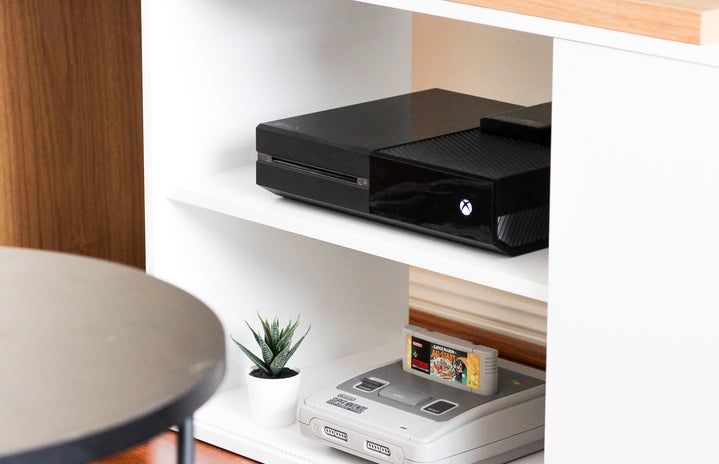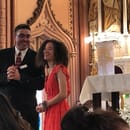On Mari’s first day in the military, she receives a small office in sector T49—it has two desks, the newest brand of uSpark computer, a uGo treadmill, a uSpeak phone, a bunk bed, and, of course, a water dispenser. “You never have to leave the office,” says her supervisor. She gives her a tired smile, something between exhaustion and boredom. “Not unless there’s an emergency, of course.” There’s a couple cabinets in the room, as well as a refrigerator, so Mari’s sure that it’s stocked with food and other necessities as well. A door in between both desks leads to a small bathroom, complete with a mirror, sink, and toilet.
She receives a roommate as well. “Mariam Halabi,” says her supervisor. “Meet Jadzia Agustín.”
Jadzia is a twenty-two year old woman named from Puerto Rico with curious eyes, a nose ring, and a mouth full of facts. “Did you know,” she says as soon as their supervisor is gone, her eyes glistening with something like wonder, “the United States used to put actual people into combat? Over fifty percent of military personnel would come back with severe post-traumatic stress disorder.” She babbles on about the old military, before the Modern Reformation, about how casualty and injury rates dropped until finally we stopped doing active combat altogether. “And now,” she sighs, with an odd look of satisfaction, “our casualty rates have dropped to almost nothing. Incredible, isn’t it?”
Mari nods. Technology is the foundation of modern civilization, after all. The military is entirely composed of computer geeks and their robotic devices—Mari was the head of her robotics team in high school, and after the military promised her a scholarship to go to college after she served for five years, she signed up.
The United States is currently in an intense fight with three countries in the Middle East, although for the life of her, Mari can never remember which. They’ve had so many conflicts in the past few decades that she can hardly keep track.
On her first day, her supervisor explains her job; she taps the touchscreen of uSpark computer and enters an app called uStar, the signature app of the American military. The computer displays a massive map on its screen—green for land, blue for water, and red for her targets. “Any time you have a new target,” announces her supervisor, “the uSpark will let you know. Any time it gives this sound” —she plays an irritating ringing sound from her uSpeak— “you have to locate your targets, wait for the all-clear, and then press this orange button, here.” She points to a large, rectangular button just below the spacebar. “It’ll destroy the target and make sure America says safe.”
It’s not much fun, but it’s honest work. Mari spends most of her days on the treadmill or sleeping; sitting in a computer all day isn’t doing any favors for her already poor posture. Day after day, she listens to her supervisors—she receives her targets, tracks them, and gets rid of them with relative ease. It’s as easy as clearing her desktop, really.
After a full week on the job, her supervisor comes into her office to congratulate her. “You’re in the top 5% of everyone in your position,” she promises. “You’re looking at a promotion, Halabi. Keep up the good work.”
Mari goes to bed that night with a sickly sweet feeling in her gut.
Bombs pummel buildings; the streets run with blood and fear. An explosion narrowly misses you, and the heat of it makes the air uncomfortably warm. There are people all around you—men, women, children—and all of them are battered and bruised. Their terror is so vivid that it thickens the bloodstained air and threatens to choke the life out of those who remain.
A man screams. Distress rolls off of him in waves. “Please, please!” he croaks. There’s a lump in his arms the size of a child. “No, please…” As you creep closer, you realize the odd mass of cloth and flesh is a child. “My son, my boy…” He grasps misshapen bundle, arms outstretched; desperation paints his features. For some odd reason, he seems to be stumbling towards you. “My son, help…”
It is then that you see the blood coating his arms, the gashes scattered over his face, and the jagged hunk of flesh missing from his leg. “Help, help him…” You don’t know what to do. You’ve never seen this much blood before, this much wounded fear pouring from someone. When he speaks again, you have difficulty understanding him, for his words have begun to slur, but you listen anyway. “Please…. You have to—” He coughs; blood—
—and her chest is thumping, faster than it’s ever been when she was on the uGo. She gasps, a small, choked sound, and sits up so fast that her head spins. What the hell was that? She’s never had a dream so vivid, so…real. Her dreams were soft, usually, like the glow of a television screen after midnight, or the sound of the uTeach robot’s voice during a kindergarten class. They were full of cartoon faces and computer-generated meadows, not—
She presses her hand to her sweaty forehead. She must be coming down with something. There’s a Russian virus going around in sector B5, something fitful that dances from one person’s tracking chip to another, contaminating the host with fevers. She doesn’t tell anyone about the dream, not even her talkative roommate, Jadzia.
She starts to forget about it—her easy, moderate dreams are back, so she forgets about all the blood she saw and moves on. By the time the next month starts, her supervisor promotes her from footsoldier weaponry to the ranks of bombers and pilots, so now she’s moved to a room with a man named Hank, who has a bright smile and a wheelchair. “I’m your pilot,” Hank announces, and with a slight movement of his left hand, his wheelchair turns to face her. “Welcome to team B45-Y.” He turned back to the screen. “We only control about five bombers at once, but it’s enough to do the job.” Hank named the squadron of planes ‘Bessie,’ after his younger sister, a college student in Boston.
Hank and Mari click almost immediately. They’re binary, honestly; she’s 1, he’s 0, and everything they do just works. They fly their squadron all around the world, from one warzone to the next, bombing wherever their services are needed. By the end of Mari’s second month, they’ve got the top kill-count in sector E.
They go out and celebrate at a bar down the road, and Mari gets so drunk that she can’t even work her voice-activated car, and Hank has to do it for her. When she falls into bed, thoughts muffled by too many drinks, her head trips headfirst into—
—splatters against the ground. He tries to take another step forward but drops to his knees instead, his arms bracing the fall of the child rather than his own. “The hospital…” He has begun to gasp now, slaving for every breath. Blood bubbles past his lips, down his chin. “Bombed… The children’s…hospital… My son…”
His expression is powerful, you haven’t seen terror like this before—it looks like the face of a man as he inhales his first lungful of water before drowning. You take a careful, terrified step back, and the man howls, “No!” Crawling forward, he advances a few feet before withdrawing one hand from his child’s body to claw at his chest. You realize, all at once, that he can’t see you anymore. You’ve taken away this man’s last hope of saving his son. Once he can no longer see you, true panc slaps him across the face; his whole body tremors. The color bleeding from his face, he scours the smoking street for you. His terrified eyes dance over empty air, and he screams when his search reveals nothing.
His face twists in anguish. He grapples with his injury, struggling to his feet, and then limps forward, barely able to put pressure on his wounded limb. He staggers, the exhaustion registering, and his knees buckle before he can take another step. Fatigued and wounded, he attempts to lean on the wall closest to him, but like the rest of the demolished city, it crumbles beneath the fingers of man. The man trips, startled by its fragility, and his hands protect his son’s head as he falls.
“Daddy,” the child whispers. The blanket wrapped around him slips as his father’s grip falters, revealing the worst of his injuries, and something inside of you wrenches painfully. He will not survive, and that is not pessimism; that is a fact. You’ve never stood before Death before, never. He must be four, maybe five, and already he has been given a death sentence. A large piece of debris skewers his bare torso; ironically, you recognize it as a piece of medical equipment. It has severed the delicate skin of his stomach, leaving his entrails vulnerable to the thick, filthy air. The blanket is now drenched in his blood; this time, instead of wondering why he is not a corpse, you wonder how much he is suffering. You’ve never known pain more than carpal tunnel, and here is this boy and his father, in such pain that they could not walk—
—and someone’s calling her name, loud and sharp and— “Mari! Mari!”
It’s Hank. He’s looking down at her, eyes wide with concern, and Mari scrambles backwards. His face… It’s in such morbid contrast with the face she just saw, the one that was dirty and bloody and terrified. She’s gasping, heavy, rapid sounds from deep inside of her, and Hank’s clean, slightly confused face squints. She presses her cold hands against her sticky neck and tries to calm down; pulling her knees up to her chest, Mari feels this dark sense of waiting, and she hates how it feels—heart racing, eyes dancing, fingers twitching, blood pumping—because she doesn’t understand it. No, it’s not waiting. It’s anticipating, like there’s a bomb about to burst through the ceiling or blood about to blossom over Hank’s blue pajamas.
“What’s wrong with you?” he asks, as Mari shivers. “What’s wrong?”
The trouble is, Mari has no idea.
Hank brings Mari to the medbay, where a uDoc buzzes over her and checks for any medical abnormalities. The uDoc, a sleeker version than the one Mari has at home, actually has a face: high-tech scanners for eyes and a speaker for a mouth. It pricks Mari’s finger, testing her for illnesses or infections, but it finds nothing. “Describe your symptoms, Lieutenant Halabi,” it orders.
So she does. She explains the sleepless nights, the dreams so vivid she could swear they are memories.
The uDoc prescribes her with sleeping pills and tells her to take the next two days off. “Stay away from horror films and violent video games,” states the uDoc. “Those are highly rated causes of dreams like the ones you described.”
Mari supposes the uDoc is right. There is little to no violence in contemporary society, save that portrayed in video games and television shows. She’s so lucky, truly, to be in a society with such profound safety. But why does she keep having these horrific dreams?
The sleeping pills help, giving her rest that’s as blank and as empty as the military office that she and Hank share. And although the dreams did terrify her, another part of Mari craves their return. She wants to understand them, fully. She wants to know why her heart patters in her chest and why this strange, humanfeeling surges in her chest every time she looks at that little boy.
So she stops taking the sleeping pills. That very same night, the dream reemerges in her mind, bringing her back to—
—in his eyes, it becomes clear. He blinks twice, delirious with pain, and mutters unintelligibly to the man, his words garbled and lost to the fabric of his father’s shirt. You are astounded by the magnitude of his eyes. Enamored, you are nearly lost in the murky tenderness of his stare; you have to consciously pull back in order to stay hidden from their comprehension. “Daddy,” the child repeats, and one small, bloody fist tightens in the man’s collar. The child’s father jerks awake, having previously slipped into unconsciousness. “I’m tired…” His eyelids sag as blood continues to pulse out of his gash, and you try to ignore how much the man’s hands are shaking.
“I know,” he wheezes, and suddenly his fear comes back in a surge of paranoia that floods you with vigor so quickly you nearly choke.
“It…hurts.”
“I know…” His fingers brush the dark hair away from his son’s eyes. “I know. Don’t… Don’t…sleep… Yet.” The boy curls further into his father’s arms, pressing his face into his chest and blocking his magnificent eyes from your view. “You’re going to…be…okay…” Disappointed, you move closer, but as soon as you approach the pair, their terror intensifies so much that they simultaneously shudder. They exchange more unsteady phrases; some of them sound strange to you. They must be terms of endearment; in every language, they are peculiar. “You’re…” He stumbles over his breath, his words snagged on a sudden shift in pain. He raises one bloodstained hand and presses it against his worst wound: a brutal laceration lining the side of skull and curling around his neck in an oddly elegant manner. The entire left side of his face is coated in scarlet; the blood is spilling too quickly now for him to— “Gonna be…”
The man’s head falls to the side, his eyes dull and tainted with agony, and his grip on the child slackens.
Before he can slip from his father’s limp clutches, you rush to him, folding him into your arms. He’s warm; you don’t think you’ve ever held a child like this before. Touched them, of course, and embraced them, but never cradled them as though it was their last night on Earth; for this boy, it is.
The boy shifts. When he looks at you, you can only find one word to describe his expression, and he has already used it himself: tired. “You’re not…Daddy…” he says, and his eyes sluggishly move to meet yours.
“No,” you whisper, but you do not clarify. Instead, you hold him, and he instinctively wraps his arms around you, burying his face into the crook of your neck. And as a plane whips past you overhead, nearly blowing you and the child into a nearby building, it’s then you realize, suddenly, horribly, what is happening.
This place… You know these buildings, this land, these hills. You’ve only seen it in lime-green computer-generated imagery and digitalized buildings, but you know this place better than most. This… This is Syria. That plane… You know its flight pattern, its every twist and turn. That’s a B-fighter plane, the same one that you and Hank use. These bombs are yours, the bullets are yours, the blood that streams between the cracks in the sidewalk is yours…
The death of the boy’s father belongs to you. And the boy’s death, too.
These people are your kills; this ravaged city is your celebration.
This blood is on your hands.
The boy whimpers when you try to adjust your grip on him, and something inside you writhes, squirming like a poisoned man grappling for his last minutes. You look into his eyes, and all you find is despair. You smooth back his hair and try to wipe the blood away from his eyes, or he has begun to whine of the sting.
You hold him with the tenderness of a parent stepping between a weapon and their child. You hold him like he is the only person you will ever love, and you wait for his warmth to fade.
Once it does, you find yourself alone in the decimated street; their corpses are merely empty shells. You stand, your arms abnormally light in the absence of the child. Regret bleeds from your fingers and toes.
You turn to humanity, and your eardrums bleed with the weight of their combined screams.
Mari wakes up slowly, as though waking from a good dream instead of a bloody nightmare. There’s something inside of her now, something the dream gave her that the military never could: empathy. It pools inside of her until hot, bubbling grief overtakes her, and before she knows it she’s crying, weeping into her hands.
She understands fully—the weight of her actions, of the mere push of a button, is an act of devastation towards masses of people. An act of devastation against the humanity. These people are her people, too. They share the same roots, thr same fear, the same love, the same gasping desperation for life.
She can still feel the boy’s beautiful eyes staring right through her, can still hear his father’s begging.
She isn’t a peacekeeper, like she wanted to be, or a protector.
No, she’s a destroyer.
And as she rises from her bed and leaves her office, she knows she must atone.



